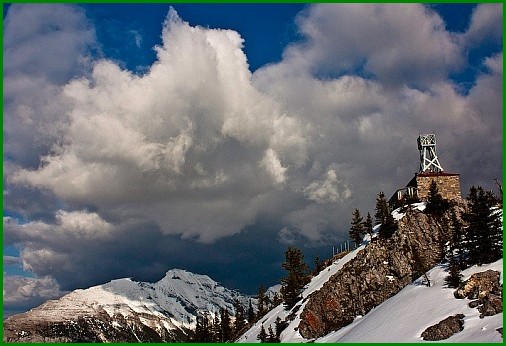Assign cosmic rays and global warming does not work, look for the cause in a person unreasonable Assign cosmic rays and global warming does not work, look for the cause in a person unreasonable.
According to some, solar activity can affect the amount of cosmic radiation reaching the earth, which will affect the formation of clouds, and thus on climate. However, Rasmus Benestad from the Norwegian Meteorological Institute has come to the conclusion that changes in solar activity can not explain global warming.
Tracking station of cosmic rays on Sulfuric mountain in Alberta, Canada (photo cec403).
Mr Benestad compared the average annual data on changes in the galactic radiation in the years 1951-2006 with annual variations of temperature, atmospheric pressure at sea level and rainfall on Earth. For information on cosmic rays have been obtained thanks to the high-rise registrar neutrons located in Climax (Colorado, USA).
The scientist was looking for examples of meteorological response to cosmic rays and in time and space, as well as checking how to react to climate change in the concentration of greenhouse gases and Southern oscillation. The idea is that the correlations are absent, that is, cosmic rays do not seem to have much effect on me selected range of basic meteorological components - emphasizes Mr. Benestad. - At least to the global average.
Among the exceptions to be noted, however, some parts of Europe.
Galactic radiation was associated with a decrease in temperature in parts of Eastern Europe. Scientists would like to clarify the situation: whether it is an ordinary match, then a correlation between cosmic rays and temperature, and pressure at sea level does exist. If the latter is true, then why this relationship is manifested only at the regional level?
This area is affected by the North Atlantic Oscillation, and this phenomenon is a bit special: it is the change in pressure at sea level for several years, - says the expert. - The constancy of these changes may accidentally coincide with changes in solar activity, and can indeed speak of sensitivity to them. According to Mr Benestad, the answers to these questions would help to clarify the ten weather forecasts in the area.
Globally, the results of the analysis show that the poor response to the global average temperature by cosmic rays is reduced to chance. Moreover, the influx of cosmic rays did not show any long-term trend. Consequently, link galactic radiation with the recent global warming is impossible.
Why is a hypothesis that cosmic rays may play a role in climate change? And why some felt that this factor is even more important than greenhouse gases?
The fact that cosmic rays ionize the atmosphere, and some scientists believe that a drop of water can condense on the ions with the result, and aerosol particles, thereby contributing to the formation of clouds, although the experiments did not confirm this conjecture.
Solar activity, which increases and decreases in the course of the 11-year cycle, leads to a periodic reduction in the inflow of cosmic rays on Earth (they are deflected by the solar wind - charged particles of the light). If the hypothesis is correct, the increase in solar activity should correlate with a decrease in cloud cover. Evidence of this is also not yet received.
Especially on anything not based on the idea that greenhouse gases do not play any role in warming: the blame, they say, lies in the cosmic rays. The people, however, this version is very popular.
A study conducted by Mr. Benestad - part of the European project TOSCA, which aims to study the impact of solar activity on the Earth's climate. It should be emphasized that the Norwegian's intention was to figure out how to respond to the cosmic rays are the main meteorological parameters, and not how they affect the physical processes in the Earth's atmosphere.
in the footsteps of Environmental Research Letters, Physicsworld.Com, compulenta.computerra.ru